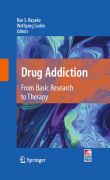
Drug Addiction: From Basic Research to Therapy provides a comprehensive overview of physiological, biochemical, and genetic pathways underlying drug addiction, and resultant efforts to develop novel treatment strategies dealing with drug addiction and other CNS disorders where the neurophysiological processes overlap, such as treatment of pain. Based on the AAPS-NIDA Frontiers in Science Symposium ‘Drug Addiction: From Basic Research to Therapies,’ this volume, representing focuses on the translation of fundamental addiction research to a variety of treatments, bringing together scientists with widely ranging expertise in synthetic and computational chemistry, molecular biology, genetics, andneuroscience with researchers in drug discovery and development, drug targeting, and quantitative therapeutics. Provides a comprehensive overview of physiological, biochemical, and genetic pathways underlying drug addiction, and resultant efforts to develop novel treatment strategies dealing with drug addiction and other CNS disorders where the neurophysiological processes overlap, suchas treatment of pain INDICE: From the contents I. General Topics.- DARPP-32 mediates the actions of multiple drugs of abuse.- Drug discovery from natural sources.- Computational methods in drug design: Modeling G protein-coupled receptor monomers, dimers and oligomers.- Symbiotic relationship of pharmacogenetics and drugs of abuse.- Monoclonal antibody form and function: Manufacturing the right antibodies for treating drug abuse.- CART peptides play a role in drug abuse and potential therapeutic agents.- RNAi directed inhibition of DC-SIGN in dendritic cells. Prospects for HIV-1 therapy.- Viewing chemokines as a third major system inthe brain.- Targeting the PDZ domains of molecular scaffolds of transmembraneion channels.- Neuronal nicotinic acetylcholine receptor expression and function on non-neuronal cells.- II. Transporters and stimulants and HALLUCINOGENS.- Role of monamine transporters in mediating psychostimulant effects.- Development of the dopamine transporter selective RTI-336 as a pharmacotherapy for cocaine abuse.
- ISBN: 978-0-387-76677-5
- Editorial: Springer
- Encuadernacion: Cartoné
- Páginas: 680
- Fecha Publicación: 01/07/2008
- Nº Volúmenes: 1
- Idioma: Inglés
